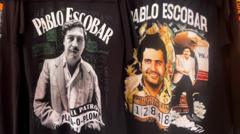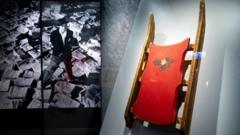As Colombia's Congress considers a bill to ban the sale of Pablo Escobar memorabilia, opinions are polarized between those who view it as an essential step toward healing and those who argue it threatens livelihoods. While some advocates prioritize the need to confront the glorification of a drug boss linked to mass violence, vendors express concerns about losing a crucial income source in a revitalizing Medellín.
Debating Escobar's Legacy: Colombia's Push to Ban Drug Lord Memorabilia

Debating Escobar's Legacy: Colombia's Push to Ban Drug Lord Memorabilia
A proposed law in Colombia aims to outlaw the sale of Pablo Escobar memorabilia, stirring controversy over its impact on local vendors and the legacy of the notorious drug lord.
A contentious law in progress within Colombia's Congress aims to ban the sale of merchandise celebrating the infamous drug lord Pablo Escobar. This initiative has sparked a multifaceted debate over the implications of such a ban, reflecting the nation's grappling with its violent past.
On November 27, 1989, Gonzalo Rojas received the life-altering news of his father's death in a bombing orchestrated by Escobar as part of a broader campaign of terror. The trauma, associated with Escobar's Medellín cartel, remains fresh for many Colombian families. Although the drug wars have faded, Escobar's legacy persists, encapsulated in a lucrative market of memorabilia marketed to both tourists and aficionados.
The proposed bill seeks to prohibit the sale of items glorifying criminals, arguing that it trivializes a tragic past. Juan Sebastián Gómez, the bill’s co-author, emphasized, "Difficult issues that are part of the history and memory of our country cannot simply be remembered by a T-shirt, or a sticker sold on a street corner." If approved, the law would impose penalties on offenders, aiming to eradicate the celebration of figures like Escobar, notorious for his involvement in the global cocaine trade, which led to an estimated 4,000 murders.
However, local vendors heavily reliant on the sales of Escobar-themed items assert that the ban could severely impact their livelihoods. Joana Montoya, a stall owner in Comuna 13, notes that up to 60% of her sales are derived from Escobar merchandise, stressing its vital role in supporting her family. "This is terrible. We have a right to work, and these Pablo T-shirts especially always sell well," she remarked, reflecting the harsh realities facing many vendors.
Gómez has proposed a transition period for vendors to adapt to the future regulations, advocating for a perception shift that focuses on celebrating Colombia's culture beyond its drug lords. Conversely, some locals, like shop assistant María Suarez, advocate for the ban, citing ethical concerns over profiting from a figure responsible for immense suffering.
The bill has raised essential reflections about Colombia's image internationally, with Gómez drawing parallels with other nations dealing with their own historical figures associated with tyranny, calling for a reevaluation of the reverence for Escobar. For Gonzalo Rojas, the legislation represents a pivotal moment to confront the commercialization of Escobar’s image and redefine narratives around victims of his crimes.
While international tourists perceive Escobar memorabilia as a piece of history, supporters of the bill argue it perpetuates a mythologized version of his legacy that disrespects the victims. As Colombia's Congress grapples with the proposed law, the dialogue surrounding Escobar continues to unfold, evidencing the country's ongoing struggle to reconcile with its past while seeking a brighter future.





















